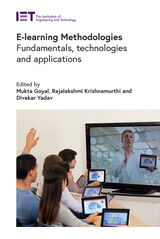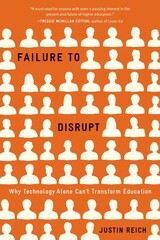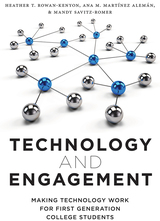

A Science “Reading List for Uncertain Times” Selection
“A must-read for anyone with even a passing interest in the present and future of higher education.”
—Tressie McMillan Cottom, author of Lower Ed
“A must-read for the education-invested as well as the education-interested.”
—Forbes
Proponents of massive online learning have promised that technology will radically accelerate learning and democratize education. Much-publicized experiments, often underwritten by Silicon Valley entrepreneurs, have been launched at elite universities and elementary schools in the poorest neighborhoods. But a decade after the “year of the MOOC,” the promise of disruption seems premature.
In Failure to Disrupt, Justin Reich takes us on a tour of MOOCs, autograders, “intelligent tutors,” and other edtech platforms and delivers a sobering report card. Institutions and investors favor programs that scale up quickly at the expense of true innovation. Learning technologies—even those that are free—do little to combat the growing inequality in education. Technology is a phenomenal tool in the right hands, but no killer app will shortcut the hard road of institutional change.
“I’m not sure if Reich is as famous outside of learning science and online education circles as he is inside. He should be…Reading and talking about Failure to Disrupt should be a prerequisite for any big institutional learning technology initiatives coming out of COVID-19.”
—Inside Higher Ed
“The desire to educate students well using online tools and platforms is more pressing than ever. But as Justin Reich illustrates…many recent technologies that were expected to radically change schooling have instead been used in ways that perpetuate existing systems and their attendant inequalities.”
—Science

Technology and Engagement is based on a four-year study of how first generation college students use social media, aimed at improving their transition to and engagement with their university. Through web technology, including social media sites, students were better able to maintain close ties with family and friends from home, as well as engage more with social and academic programs at their university. This ‘ecology of transition’ was important in keeping the students focused on why they were in college, and helped them become more integrated into the university setting. By showing the gains in campus capital these first-generation college students obtained through social media, the authors offer concrete suggestions for how other universities and college-retention programs can utilize the findings to increase their own retention of first-generation college students.
READERS
Browse our collection.
PUBLISHERS
See BiblioVault's publisher services.
STUDENT SERVICES
Files for college accessibility offices.
UChicago Accessibility Resources
home | accessibility | search | about | contact us
BiblioVault ® 2001 - 2024
The University of Chicago Press









